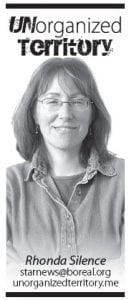I’ve written about the weather a few times in recent weeks. I was beginning to sound like a broken record, so last week I changed the subject and talked about government transparency and the need for legal notices to be published in the newspaper. I’m continuing that theme in Unorganized Territory this week, despite the fact that the title may make readers think otherwise.
The Sunshine Week I’m talking about is not our ever-soslowly arriving spring weather. Yes, I’ve been enjoying the last few days of sunny skies and relatively warm weather, but I’m talking about a different kind of sunshine. This column is about the role of newspapers in shining a light on government activities to ensure that public officials are not operating in the shadows.
I’m proud to join thousands of other members of the news media, civic groups and nonprofits; library and school officials; and others interested in protecting the public’s right to know in celebrating Sunshine Week on March 16-22.
Sunshine Week was initiated in 2002 by the Florida Society of Newspaper Editors. What better place to start a sunshine campaign than in the Sunshine State, right? But the Florida association began the campaign not in celebration of its non-winter weather, but to fight what it felt was an attack on open government by the Florida state legislature. The Florida legislature tried to create numerous exemptions to existing open government laws. Because of the increased publicity that resulted from the Florida newspaper association’s campaign, most of those measures failed. Sunshine Week was born.
Several states followed Florida’s lead and in 2003 the American Society of News Editors launched the first national Sunshine Week. It was decided that this non-partisan, non-profit initiative would be celebrated in mid-March each year to coincide with James Madison’s birthday on March 16.
All across the country there are events in recognition of Sunshine Week. In Washington, D. C., the U.S. Senate Judiciary Committee held a hearing entitled Government and Freedom of Information: Reinvigorating the Freedom of Information Act for the Digital Age on March 11. They hosted discussion by a panel of experts—from the Department of Justice, from OpentheGovernment.org, from the University of Arizona School of Journalism and others.
Also in Washington, D.C., the Newseum, the national newspaper museum, hosted National Freedom of Information Day on March 14, with panel discussions and speakers on topics such as Media Leaks Past and Present.
In Illinois, the Chicago Headline Club hosted the second annual Freedom of Information (FOIA) Fest on March 14, offering a full day of workshops on how to work through the documents to file a FOIA request.
There are numerous other events, in Columbia, Missouri, in Las Cruces, New Mexico, in Oklahoma City and Indianapolis, Indiana. I would love to attend any one of these events.
Since I can’t get away to participate I’m doing my small part to promote Sunshine Week by talking about it in Unorganized Territory. I want to assure the public that all of us at the Cook County News- Herald will continue to serve as watch dogs working to see that the public has access to government records and information, that all meetings of government bodies are fully noticed and open to the public, and that new technology is not used to skirt open meeting laws.
It isn’t always easy. Many times obstacles to providing public data are not intentional. A government employee may ask “Why do you want that information?” out of concern for a coworker or client’s privacy. However, there is very little government data that is truly private and that hesitancy to provide the information could be a violation of the Freedom of Information Act.
A government office may upgrade its computer system to a format that is no longer compatible with that of a newspaper— or the average citizen. Intentional or not, that raises a red flag for journalists.
Sometimes government officials intentionally create obstacles. Regularly scheduled meetings are rescheduled, there are no written agendas, or information distributed to government boards is not made available to the public. Meeting minutes are not distributed. Board or committee members arrive at a meeting already well versed in the issue at hand, ready to make a decision—as if there has been discussion before the meeting. All of these are signs that the public is not being fully informed about government activities.
I hope readers stop and think about the importance of open government and freedom of information. And I hope people realize that it is not only the job of the media to ensure that our government officials follow the rules. Sunshine Week organizers explain that the purpose of the week and its events is to “enlighten and empower people to play an active role in government at all levels, and to give them access to information that makes their lives better and their communities stronger.”
Government officials need to commit to sharing information, even that which might be discomforting, with the public. Government employees need to be responsive to requests for information in a timely manner. And the public needs to get involved, attending meetings and asking questions of our government representatives. Everyone needs to work together to fulfill the Sunshine Week motto: Open government is good government.
The advancement and diffusion of knowledge is the only guardian of true liberty.
James Madison



Loading Comments